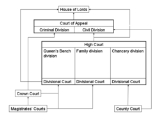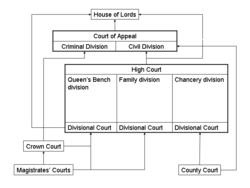
Family Proceedings Court
Encyclopedia

Magistrates' Court
A magistrates' court or court of petty sessions, formerly known as a police court, is the lowest level of court in England and Wales and many other common law jurisdictions...
when members of the family panel sit to hear a family case. It is a court of first instance in England and Wales
England and Wales
England and Wales is a jurisdiction within the United Kingdom. It consists of England and Wales, two of the four countries of the United Kingdom...
that deals with family matters. Cases are either heard in front of a bench of lay magistrates or a District Judge (Magistrates' Courts).
System of Family Courts
The present system of family courts was introduced following the implementation of the Children Act 1989Children Act 1989
The Children Act 1989 is a British Act of Parliament that altered the law in regard to children. In particular, it introduced the notion of parental responsibility. Later laws amended certain parts of the Children Act...
.
Under this system, the following courts deal with family matters:
a. The family proceedings court. This is the name given to the magistrates’
court when members of the family panel sit to hear this type of case.
b. The county court
County Court
A county court is a court based in or with a jurisdiction covering one or more counties, which are administrative divisions within a country, not to be confused with the medieval system of county courts held by the High Sheriff of each county.-England and Wales:County Court matters can be lodged...
. There are a number of ‘different’ county courts as far as
family proceedings are concerned. Some have no family jurisdiction at all.
Those that do always have jurisdiction to deal with divorce, but fall into one of three categories:
i. County courts that only have a divorce jurisdiction.
ii. Family hearing centres. These county courts can, in addition to divorce
cases, hear contested private law cases and adoption applications.
iii. Care centres. These county courts can hear all family matters including
public law
Public law
Public law is a theory of law governing the relationship between individuals and the state. Under this theory, constitutional law, administrative law and criminal law are sub-divisions of public law...
cases. The Principal Registry of the Family Division is the care
centre for London
London
London is the capital city of :England and the :United Kingdom, the largest metropolitan area in the United Kingdom, and the largest urban zone in the European Union by most measures. Located on the River Thames, London has been a major settlement for two millennia, its history going back to its...
.
c. The High Court of Justice
High Court of Justice
The High Court of Justice is, together with the Court of Appeal and the Crown Court, one of the Senior Courts of England and Wales...
. Normally the Family Division.
Work can move between the tiers as it is important that the case is dealt with at an
appropriate level.
Jurisdiction
The FPC's jurisdiction is derived from the Magistrates' Court Act 1980.The Children Act 1989 provides the basis for most applications dealing with
children. Beyond the 1989 Act, magistrates continue to have quite separate powers to make
maintenance orders between spouses to protect them from one another, to protect
‘associated persons’ and to regulate occupation of the family home. Different statutes must be considered depending upon the case. The main provisions that affect law and procedure in the family proceedings court are:
a. Domestic Proceedings and Magistrates’ Courts Act 1978
b. Magistrates’ Courts Act 1980
c. Adoption and Children Act 2002
d. Child Support Act 1991
e. Children Act 1989
f. Family Law Act 1996.
Public law and private law cases
The family proceedings court plays a key role in what are caled:
a. Public law cases (e.g. applications for care or supervision orders in respect of children who are at risk, usually brought by local authorities)
b. Private law cases (e.g., disputes between parents concerning the upbringing of children)
Other work dealt with includes:
a. Applications by spouses for financial provision for themselves, i.e., provision for parties who remain married—maintenance arrangements for
children are for the most part dealt with by the Child Support Agency
Child Support Agency
The Child Support Agency is a delivery arm of the Child Maintenance and Enforcement Commission in Great Britain and the Department for Social Development in Northern Ireland...
(CSA)
b. Non-molestation orders to prevent domestic violence and involving, where appropriate, the use of powers to arrest
c. Occupation orders to keep a spouse out of the family home and also involving,
where appropriate, the use of powers to arrest
d. Declaration of parentage
e. Adoption
Adoption
Adoption is a process whereby a person assumes the parenting for another and, in so doing, permanently transfers all rights and responsibilities from the original parent or parents...
, i.e., orders giving parental rights and duties in respect of a child to adoptive parents
f. Enforcement concerning, for example:
i. 1989 Act cases
ii. Orders for financial provision for spouses, ncluding enforcement of assessments by the CSA and of maintenance orders from abroad, and vice versa (known as ‘reciprocal enforcement’)
g. Variation and enforcement of ‘old’ maintenance cases.
Rules of Court
The rules of the Family Proceedings Court are in the The Family Proceedings Rules 2010. Where those rules are silent on a matter then the Magistrates' Courts Rules 1981 (as amended) apply.Constitution
Family proceedings courts must be made up of three magistrates from the familypanel and include a man and a woman, unless this is impracticable, when a
minimum of two is allowed. A family proceedings court may comprise a district
judge as chairman and one or two lay justices who are members of the family
panel. If this is not practicable the district judge may sit alone.
Family Panel
Family panels are made up of magistrates elected by their local colleagues for this work on the basis of their aptitude and personal suitability (except in London where different arrangements exist). In addition to their special duties in the family proceedings court, members of the panel continue to serve in the ordinary magistrates’ court. Different arrangements for the selection of magistrates to sit in the family proceedings court are likely to be in place in 2006 after the CourtsAct 2003 is fully implemented.Chairmen and deputy chairmen
The panel appoints its own chairman. It also elects enough deputy court chairmen to ensure that family proceedings are always chaired by someone trained for this role. Different provision for chairmen will also be in place from 2006.
Appeal from Magistrates' Court in Family matters
Provisions contained within the Access to Justice Act 1999 (Destination of Appeals) (Family Proceedings) Order 2009 s.4 insert s.111A into the Magistrates’ Court Act 1980. This section dictates that:“(1) This section applies in relation to family proceedings in a magistrates' court."
"(2) Any person who was a party to any proceeding before the court, or is aggrieved by the order, determination or other proceeding of the court, may question the proceeding on the ground that it is wrong in law or is in excess of jurisdiction by appealing to a county court.”
Subsequently all appeals from the Magistrates’ Court will now be dealt with by the County Court and will have 21 days in which to file the appeal. [s.111A(4)]

